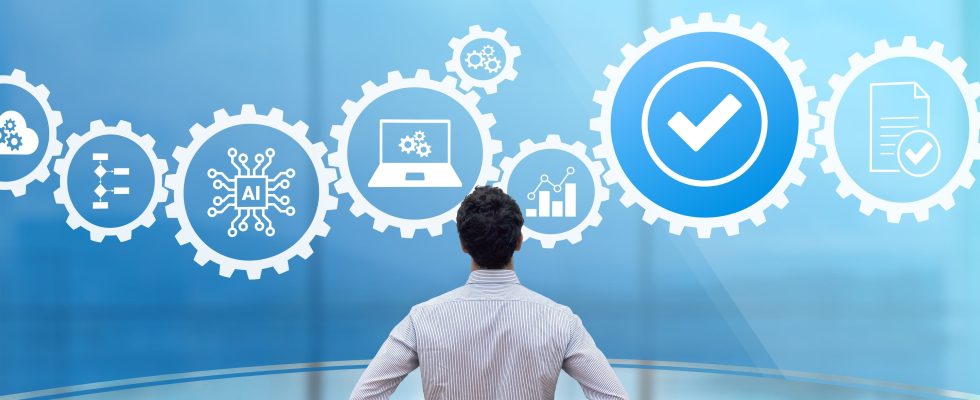“Less work, more free time”
On paper, the promise is tempting: to be assisted in your professional tasks by a program that generates the desired results for you, therefore making the work easier and, above all, faster. This hope is nevertheless well founded: thanks to the help of generative artificial intelligence, consultants, for example, went 25% faster in their missions, calculated the Harvard Business School during an experiment carried out last year in the UNITED STATES. According to another study, carried out by the think tank Autonomy and based on the productivity gains possibly brought by generative AI across the United Kingdom, some 8.8 million British workers, or 28% of the workforce, could thus move to a 32-hour week spread over four days.
Not sure, however, that a reduction in working hours is in the plans of AI-boosted companies. “Aren’t we going to want to allocate this time to the development of another work activity?” asks Julien Malaurent, professor at Essec Business School, expert in information systems. This already seems to be confirmed in the field, according to Emilie Sidiqian, boss of Salesforce France: “In customer service, where AI is already being deployed rapidly, the time saved is used for new services for customers and rehumanizing relationships. .” After all, in her research on the rise of household appliances in the 20th century, American economist Juliet Schor did not conclude that we have not spent less time cleaning since they entered our lives ? Our expectations in terms of cleanliness have just evolved accordingly… And for the open space of the 21st century? Emilie Sidiqian believes more in a “rebalancing”. “The five-day week will persist, but with more quiet moments to develop curiosity, innovation…” Another type of time for yourself. But still in the office.
“Executives will be the only ones concerned”
It’s a certainty: generative artificial intelligence will transform the lives of executives. AI, the one born with ChatGPT in November 2022, can produce simple texts, press releases, computer code, images. She is also capable of writing emails, taking notes, summarizing more or less technical documents. One of the fairly widespread beliefs is to think that white-collar workers will be the only ones affected. In reality, two-thirds of jobs will be impacted in one way or another by generative AI in the United States, according to consulting firm EY. Around 40% worldwide, indicates the IMF. So-called intellectual professions will also be affected. “At a minimum, artificial intelligence will facilitate the work of researchers. If AI tools gradually support humans in identifying new hypotheses, creating protocols and carrying out experiments, then the production of relevant ideas will increase,” underlines in a positive manner the report of the French commission on artificial intelligence, delivered on March 13.
What will it be for creative professions, in design, graphics or writing? These new machines are already fierce competitors for their jobs. “The drop in income is looming, particularly for additional income, which raises the question of starting a career in creation,” warns the French committee dedicated to AI. And for blue-collar workers, blue-collar workers and artisans, the most manual workers in short? Advances in robotics, where generative AI is increasingly being integrated, suggest that many tools used in industry will also benefit from it in the near future. Without it being, for all professions, a simple question of skills or even age. This is one of its advantages: its simplicity of use, via natural language, makes its distribution easy, through almost childish applications like ChatGPT. Nothing insurmountable therefore for seniors, for example, often presented as less agile with new technologies.
“We are all going to become super-performers”
“Generative AI gives people superpowers,” says McKinsey. It is true that until now, numerous experiments have shown that technology considerably boosts – by 25 to 35% – the productivity of certain workers. According to figures collected by the French committee on AI, 72% of employers using artificial intelligence note a positive impact on their employees, in particular on the reduction of tedious tasks and the risk of errors. Be careful, however, not to get too carried away. The study of consultants by Harvard Business School showed that the effects of generative AI were not the same depending on skill level. The less “good” would ultimately benefit more than those who are already successful in their professions. Then, AI risks shifting expectations within companies. For many years, research on automation has all ended with the same conclusions. “More than ever, humans will have to reveal themselves through their behavioral qualities: empathy, listening, the ability to build relationships,” says Julien Malaurent. “The innovative dimension, a source of improvement, the machines are not going to have. The discovery comes from the “transgressive” human spirit”, adds the sociologist of work Danièle Linhart.
A little humility doesn’t hurt either. “The quest for superperformance often has deleterious effects and requires injunctions: “Be excellent, surpass yourself, get out of your comfort zone”… Why not want to live more peacefully?”
.
